Text
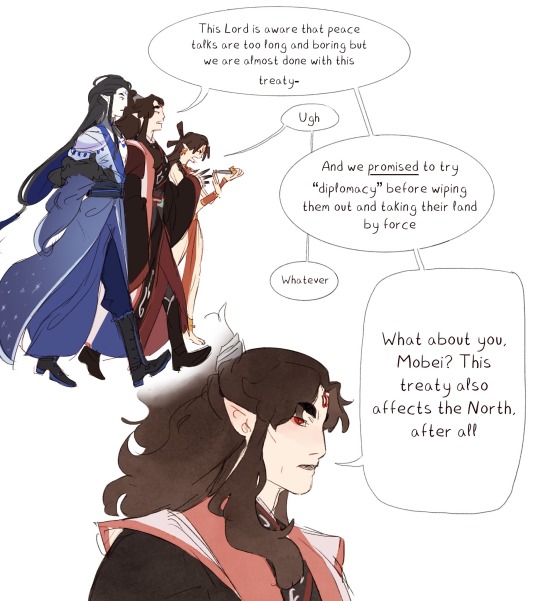

He heard Shang Qinghua call Binghe his son ONCE and ran with his own conclusions
5K notes
·
View notes
Text

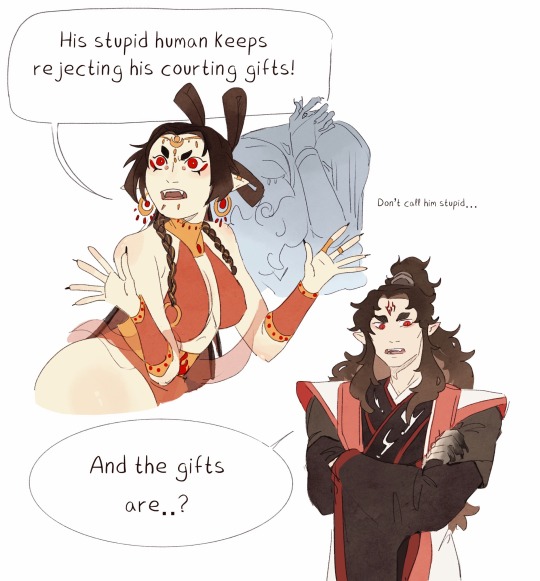
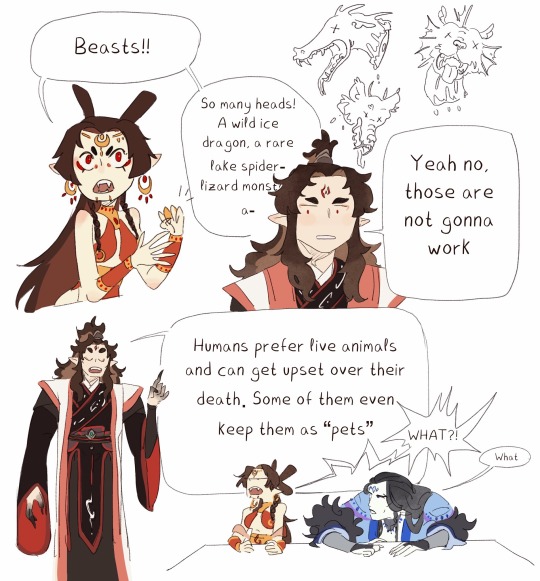
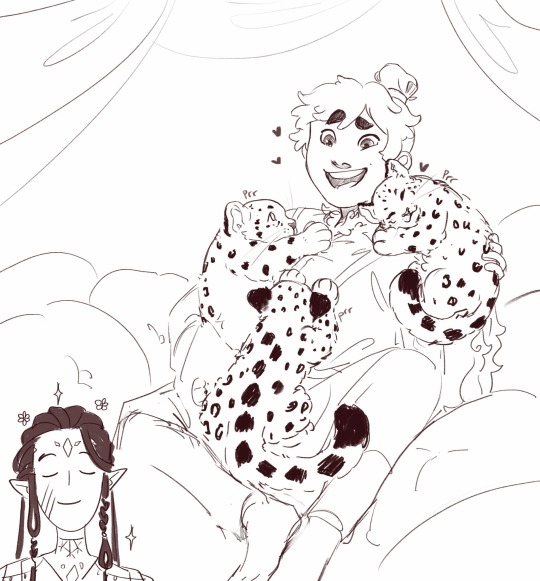
Just in, worst person to get love advice from is actually right for once
11K notes
·
View notes
Text
5 simple exercises to awaken dormant muscles
{source}
199K notes
·
View notes
Text
Not to be USamerican on main, but it is really frustrating seeing people scream "Vote Blue no matter what! People will die, but it'll be less" to the people who are literally being genocided by the current Democratic leadership. If you have to say it, say it with your whole chest: you think their people are acceptable casualties.
What's also absolutely infuriating is this soapboxing about ~pure ideologism preventing actual structural change~ when people say they don't want to vote. Do you think we don't know our options are dogshit? Do you think we don't know that other countries have structurally better democracies? This is especially frustrating coming from non-USamericans who act like every single American is too stupid to understand our own political system. It's not like several of us have been victims of federal policy, regardless of whether or not they wear red or blue. It's also not like several of those choosing not to vote in the way people demand are making strategic political decisions elsewhere.
I completely understand being frustrated that the world has to bow to the whims of the U.S. Empire. But a lot of you are just sanctimonious pricks about it.
#vent#lenore vents#this is not supposed to be coherent political commentary just venting#a lot of people i follow have turned into this kind of commenter#and i wish they'd keep their mouths shut sometimes
0 notes
Text
i honestly cant believe the normal amount of wanting to be another gender is zero. like arent you sick of yours yet lol
#sometimes i wonder what it'd be like to be More Neutral.#idk how to describe it#feminine presenting#aligned with generally cis women of color's experiences#but not a woman#anyway cis+ she/they for the win
32K notes
·
View notes
Text
A Guide to the Chinese Underworld (and what it isn't)
As many FSYY and fox posts as there were on my blog, I am actually a huge fan of the Chinese Underworld mythos. Mostly because I was once a morbid little kid that loved reading about the excavations of ancient tombs, and found the statues depicting hellish torture in the Haw Par Villa "super cool".
Apart from the aesthetics, the history of its evolution is also fascinating. Most of us, Chinese or not, only know the most popular version of the Underworld——the "Ten Kings" system, yet that isn't always the case. So today, I'll start off with a short summary of that.
In pre-Qin era, there was already this generic idea of a "Realm of the Dead" called the Yellow Spring, Youdu, or Youming, but we know very little about it.
Then, in the Han dynasty, two ideas start to emerge: 1) the Underworld is a bureaucracy, 2) the God of Mt. Tai ruled over the dead.
This early bureaucracy might not function as an agent of punishment; the main focus was on keeping the dead segregated from the living so they wouldn't bring diseases and misfortune to the latter, as well as using those ghosts to enforce collective punishments upon people for their lineage's wrongdoings while they were still alive.
Post-Han, after Buddhism entered China and took root, its idea of karmic punishments and reincarnation and the figure of King Yama was merged with folk and Daoist ideas of the Underworld bureaucracy, and, came Tang dynasty, resulted in the "Ten Kings" system that first appeared in Dunhuang manuscripts.
It was very rudimentary and far from well-established, as seen in Tang legends, with some adopting the Ten Kings system, some sticking to the Lord of Mt. Tai and some favoring King Yama, and overall little agreements on who's in charge of the Underworld.
But the "Ten Kings" system would become the mainstream version from then onwards, used in Ming vernacular novels and made even more popular by folk religion scrolls like the Jade Records (Yuli Baochao).
As such, most points in the following sections will be based on the fully matured "Ten Kings" system of the Underworld, as seen in the Jade Records and JTTW.
What happens when you die?
(This is a fictionalized walkthrough of the posthumous fate of souls under the "Ten Kings" system. I try to stick to the very broad progression outlined in the Jade Records, but many creative liberties are taken on the details.)
Let's say there's a guy named Xiao Ming, and he had just died of a heart attack. Bummers. What now?
Well, the first thing he saw would be the ghost cops.
There isn't really an unanimous agreement on who these ghost cops are: they may be a pair of ghosts in white and black robes, wearing tall hats (Heibai Wuchang), they may have the heads of farm animals (Ox-Head and Horse-Face), or they can just be generic ghost bureaucrats. For convenience's sake, let's say it was the first scenario.
"Who are you guys and where are you taking me?"
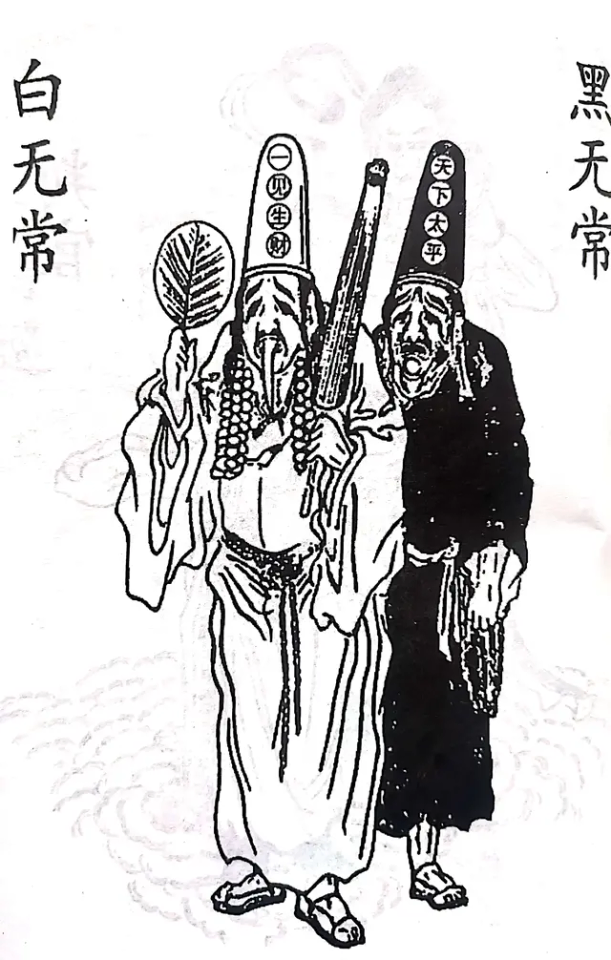
"Glad you asked!" The taller ghost cop, being the cheerful one of the pair, replied. It wasn't very reassuring, considering that his tongue was dangling out of his mouth way further than it should. "I'm the White Impermanence, my sour-looking colleague here is the Black Impermanence, and we are taking you to the City God's office."
This City God, a.k.a. Chenghuang, is just like how it sounds: the divine guardian of a city, who also pulls double duty as the head of the local Dead People Customs Office. They are usually virtuous officials deified posthumously, and in JTTW, they fall under the category of "Ghostly immortals", together with the Earth Gods a.k.a. Tudi.
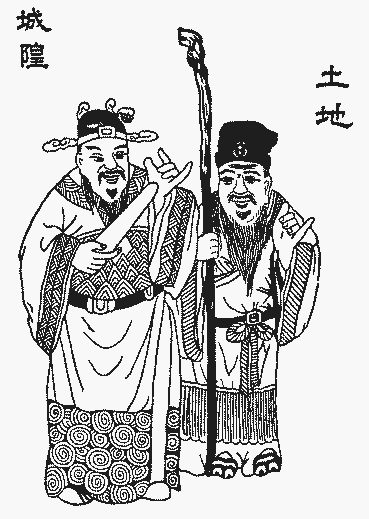
So Xiao Ming went with the two ghost cops——not like he had much of a choice, made his way through the long queue at the City God's office, and was now standing in front of a gruff old magistrate in traditional robes.
"Name?"
"Wang Xiao Ming."
"Age and birth dates?"
"21, April 16 2003…"
After he was done asking questions, the City God flipped through his ledger, then picked up a brush, ticked off Xiao Ming's name, and told him to go get his pass in the next room. More waiting in a queue. Wonderful.
"I never heard anything about needing a pass to get to the Underworld," the girl in front of Xiao Ming asked the ghost cops, who were standing guard nearby. "Is this a new policy or something?"
"Yeah. In the old days, we'd just drag y'all straight to the Ghost Gate." The ghost cop in black said, then muttered to himself, "Fuckin' paperworks and overpopulation, man…"
(This "Dead People Passport" thing was popularized in the middle-to-late Ming dynasty, as shown by the discovery of such documents inside tombs in southern China. )
(It might have evolved from similar passes to the Western Pure Land in lay Buddhism that recorded their acts of merits. Which, in turn, might be traced back to the "Dead People Belongings List" of Han dynasty, to be shown to Underworld bureaucrats so that no one would take away the dead's private property down there or something.)
Anyways, after he received his pass, Xiao Ming departed together with the rest of the bunch, to be led to the Ghost Gate. It was like the world's most depressing tourist group, where instead of tour guides, you got two ghost cops in funny hats, and the only scenery in sight was the desolation of the Yellow Spring Road.
They weren't the only travellers on the road, though. Xiao Ming noticed other groups moving in the far distance, behind the fog and the flickering ghostfire, led by similar figures in black and white.
It made a lot of sense; realistically, there was no way two ghost cops could fetch hundreds of thousands of dead people all by themselves.
(SEA Tang-ki mediums believed there were multiple Tua Di Ya Peks——Hokkien name for the Black and White Impermanences, working for different Underworld Courts.)
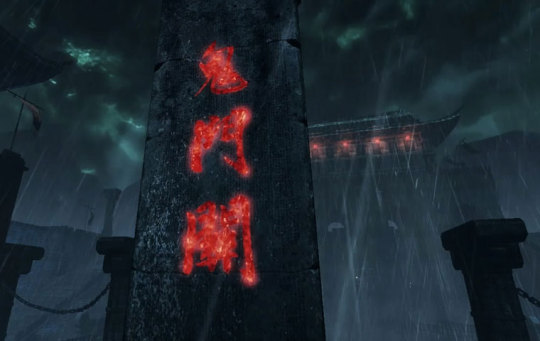
At last, the Ghost Gate stood in front of Xiao Ming, guarded by two towering figures. Normally, they'd be Ox-Head and Horse-Face, like what you see at Haw Par Villa's Underworld entrance.
However, older Han dynasty works like Wang Chong's 论衡·订鬼 also mentioned two gods, Shenshu and Yulei, as guardians of the Ghost Gate, who would use reed ropes to capture malicious ghosts and feed them to tigers, making them possibly the earliest incarnation of "Gate Gods".
So here, they were what Xiao Ming sees, standing side by side like proper doormen, silently watching herds of ghosts being funneled through the entrance.
The place was more crowded than a train station during the CNY Spring Rush; the ghost cops had already said their quick goodbye and left to fetch the next group of dead people, leaving the resident officials of the Underworld proper to maintain order and quell any would-be riots.
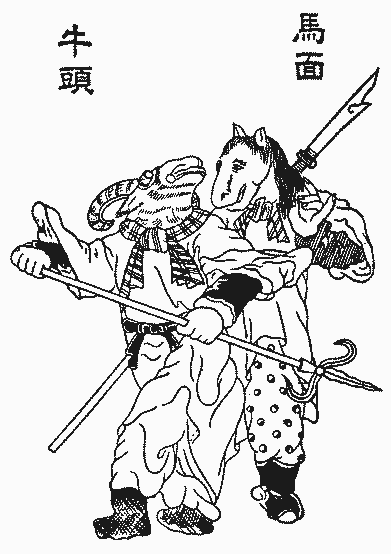
Now you started seeing the Ox-Head and Horse-Face guys, poking at unruly ghosts with their pitchforks and dragging away the violent ones in chains. Among their ranks were other monstrous beings, blue-faced yakshas and imps, but also regular dead humans who look 100% done with their jobs, like the lady who stamped Xiao Ming's pass when it was finally his turn.
After this point, Xiao Ming had entered the Underworld proper, and his next destination would be the First Court, led by King Qin'guang. Here, his fate should be decided by what is revealed in the King's magical mirror.
If Xiao Ming was a good guy, or someone who had done an equal amount of good and bad things in life, he'd be sent straight to the Tenth Court for reincarnation. However, if the mirror, while replaying his life events, had displayed more evil deeds than good ones, he'd be sent to one of the 2nd-9th Courts for judgment and then punished inside the Eighteen Hells.
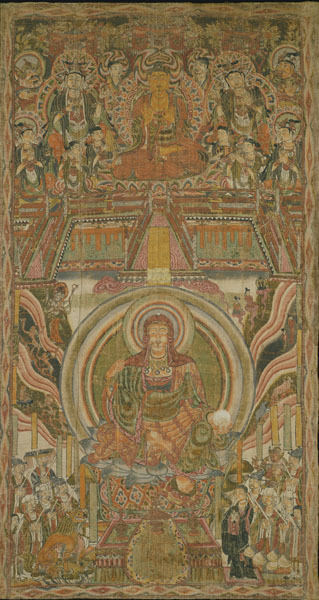
Each of the Ten Kings was also assisted by ghostly judges. Many of them were righteous and just officials in life who had been recruited into the Ten Courts posthumously——Cui Jue from JTTW is one such example, while others were living people working part-time for the Underworld, like Wei Zheng, Taizong's minister.
We decide to be nice to Xiao Ming, so, after reliving some embarrassing childhood incidents and cringy teenage phases in front of a bunch of dead bureaucrats, he was found innocent and sent to the Tenth Court.
The queue here was almost as long as the First Court's, stretching on and on alongside of the banks of the Nai River. King of the Turning Wheel made his judgment without even lifting his head when it was Xiao Ming's turn:
"Path of Humans, male, healthy in body and mind, ordinary family. Next!"
Exiting the Tenth Court building, Xiao Ming saw the Terrace of Forgetfulness, standing tall before six bridges, made of gold, silver, jade, stone, wood, and…some unidentified material. Before he could get a good look at them and the little dots moving across those bridges, he was hurried into the Terrace by the ghostly officials.
Now, both JTTW and the Jade Records mention multiple bridges across the Nai River. In the former, there is 3, and the latter, 6. The bridges made of precious materials are for people who will reincarnate into better lives, as the wealthy, the fortunate, and the divine, while the Naihe Bridge is either the common option or the terribad shitty option.
However, the Naihe Bridge proved to be so iconic, it became THE bridge you walk across to reincarnate in popular legends.
Anyways, back to Xiao Ming. He found himself standing in a giant soup kitchen of sorts, with an old lady at the counter, scooping soup out of her steaming pot and into one cup after another.
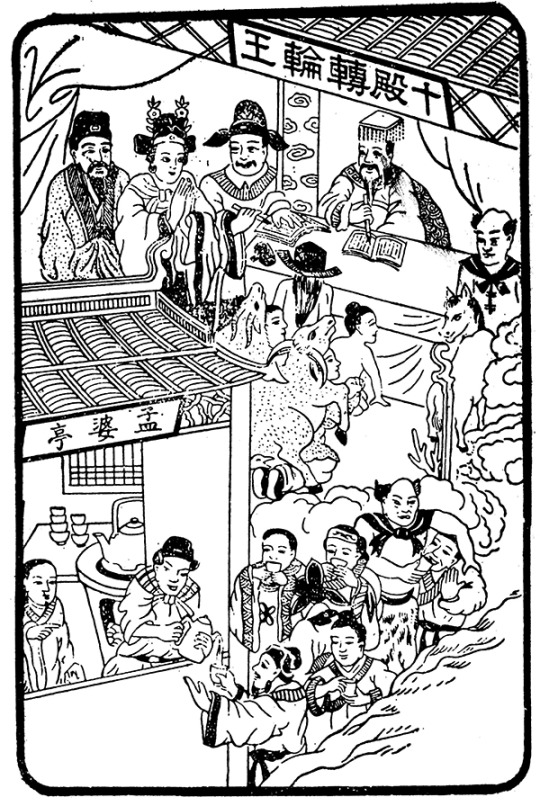
This is Mengpo, the amnesia soup granny; according to the Jade Records, she was born in the Western Han era, and a pious cultivator who thought of neither the past nor the future, only knowing that her surname was Meng.
Made into an Underworld god by the Jade Emperor, she cooks a soup of five flavors that will wipe the memory of the dead, making sure they do not remember any of their past lives once they reincarnate.
It tastes awful. Like what you get after pouring corn syrup, coffee, chilli sauce, lemon juice and seawater into the same cup.
Such was Xiao Ming's last thought, as he gulped down the soup, and then he knew no more.
Things you should know about the Chinese Underworld:
1. It's not the Christian Hell.
Rather, the Chinese Underworld functions somewhat like the Purgatory, in that there are a lot of torment, but the torment's not eternal, however long the duration may be. Once you finish your sentence, you get reincarnated as something else, though that "something else" is not a guaranteed good birth.
Other people can also speed up the process via transferring of merits: hiring a priest/monk to chant sutras and perform rituals, for example, or performing good deeds in life in dedication to the dead, or they can pray to a Daoist/Buddhist deity to save their loved ones from a dreadful fate.
Interestingly enough, a thesis paper I read mentions that, whereas Buddhist salvation from the Hells was based on transference of merits——you give monks offerings and pay them to chant sutras, so they can cancel out the sinners' bad karma with good ones, Daoist ideas of salvation tend to involve the priest going down there, sorting it out with the Underworld officials, and taking the dead out of the Hells themselves.
(The paper also stops at the Northern-Southern and Tang dynasties, so the above is likely period-specific.)
2. Nor is it run by evil demons.
Underworld officials are not nice guys and look pretty monstrous and torture the sinful dead, but they are not the embodiment of evil. Rather, the faction as a whole is what I'd call Lawful Neutral, who function on this "An Eye for An Eye" logic, where every harm the sinner caused in life must be returned to them, in order for their karmic debts to be cleansed and move on to their next life.
They can absolutely be corrupt and incompetent and take bribes——Tang dynasty Zhiguai tales and Qing folklore compendiums featured plenty of such cases, but that's a very mundane and human kind of evil, not a cosmic/innate one.
This is just my personal opinion, but if you want to do an "evil" Chinese Underworld? It should be a very bureaucratic evil, whose leaders are bootlickers to the higher-ups, slavedrivers to their rank-and-file workers, and bullies who abuse their power over regular dead people.
Not, y'know, Satan and his infernal legions or conspiring Cthulu cultists.
3. The Ten Kings are not Hades.
Make no mistake, they still have a lot of power over your average dead mortal. But in the grand scheme of things? They are the backwater department of the pantheon, who only show up in JTTW to get pushed around and revive the occasional dead people.
When Taizong made his trip to the Underworld, the Ten Kings greeted him as equals——kings of ghosts to the king of the living. If they see themselves as equal in status to a mortal emperor, then, like any mortal emperors, they are subordinate to the Celestial Host, and the balance of power is not even remotely equal or in their favor.
Also, it isn't said outright, but under the Zhong-Lv classification of immortals JTTW is using, Underworld officials will likely be considered Ghostly immortals, the lowest and weakest of the five types, much like Tudis and Chenghuangs.
Essentially: they are ghosts that are powerful enough to not reincarnate and linger on and on, spirits of pure Yin as opposed to true immortals, who are beings of pure Yang.
It's pretty much the shittiest form of immortality, the result you get when you try to speedrun cultivation (the Zhong-Lv text also made a dig at Buddhist meditation here), and if they don't reincarnate or regain a physical body, there is no chance of progressing any further.
Oh, and fun fact? In the Song dynasty, commoners and literati elites alike believed that virtuous officials in life would get appointed as ghostly officials in death.
However, the latter viewed it as a punishment. Which was strange, considering how they still held the same position and the same amount of authority, just over dead people instead of living ones, so there should be no big losses, right?
Well...it was precisely the "dead people" part that made it a punishment. See, a lot of the power and prestige they had as officials came from the benefits they could bring to their families and kins and native places, as well as the potential wealth and reputation bonuses for themselves.
A job in the Dead People Supreme Court would give them the same workload, but with none of those benefits. Since all the dead people had to reincarnate eventually, they couldn't have a fixed group as their power base, or keep their old familial ties and connections. At most, they could help out an occasional dead relative or two.
Like, working for the Underworld Courts was the kind of deadend (no pun intended) job not even living officials wanted for themselves in the afterlife. That's how hilariously sad and pathetic they are.
4. In JTTW at least, they aren't even the highest authorities of the Underworld.
That would be Bodhisattva Ksitigarbha, who is technically their boss, though he seems to be more of a spiritual leader than someone who is actually involved in running the bureaucracy.
Which makes sense, since he has sworn an oath to not attain Buddhahood until all Hells are empty, and his role is to offer relief and salvation to the suffering souls, not judging and punishing them.
Now, historically...even though Ksitigarbha in early Tang legends was still the savior of the dead, he seemed to be unable to interfere with the judicial process of the Underworld, merely showing up to take people away before they were judged by King Yama.
However, in the mid-Tang apocryphal "Sutra of Bodhisattva Ksitigarbha" (地藏菩萨经), he had evolved into the equal of King Yama, with the power of supervision over his judgements. By the time the Scripture on the Ten Kings came out, in artistic depictions, the Ten Kings had become fully subservient to him.
5. Diyu usually refers to the prison-torture chamber part, not the courthouse, nor is it the entirety of the Underworld.
And for the majority of souls that haven't committed crimes, they'll only see the courthouse part before they are sent to reincarnation. That's why I personally don't like, or use the name Diyu for the Chinese Underworld: I prefer the term Difu ("Earth Mansions"), which encompasses the whole realm better.
Also: even though historical sources like the Scripture on the Ten Kings and Jade Records seem to suggest that the dead were just funneled through this Courthouse-Prison-Reincarnation pipeline with no breaks in between, in practice, that isn't the case.
According to popular folk beliefs, after the dead were done with their trials/sentences, they stayed in the Underworld for a period of time and led regular lives, while functioning as ancestor spirits and receiving offerings.
Which would imply that the Underworld had a civilian district of sorts, populated by regular ghosts, making the whole realm even less of a direct Hell/Purgatory equivalent.
6. It is located in a different realm, but still part of the Six Paths and doesn't exist outside of reality.
In Buddhist cosmology, like the Celestial Realm, the Underworld is part of the Realm of Desires and thus subject to all the woes of samsara.
The pain and misery of the Path of Hell may be the worst and most obvious, but becoming a celestial being isn't the goal of serious Buddhists either: despite all the pleasures and near-infinite lifespan they enjoy, they are not free from samsara and will eventually have to reincarnate.
So if, say, the world is being destroyed at the end of a kalpa, all beings of the Six Paths will perish alongside it, leaving behind a clean slate for the cycle to start anew. The dead won't all end up in the Underworld and face eternal damnation.
7. The Black and White Impermanences would not appear in the Underworld pantheon formally until the Qing dynasty.
The concept that when you die, you get fetched to the Underworld by petty ghost bureaucrats is already well-established in Tang legends, but these were just generic ghost bureaucrats in all sorts of colorful official robes, with yellow being the most common color.
The idea of there being two specific psychopomps in black and white would only become popular in the Qing dynasty. Mengpo is kinda similar: although she existed before the Ming-Qing era as a goddess of wind, venerated by boatmen, her "amnesia soup granny" incarnation came from the Jade Records.
603 notes
·
View notes
Text
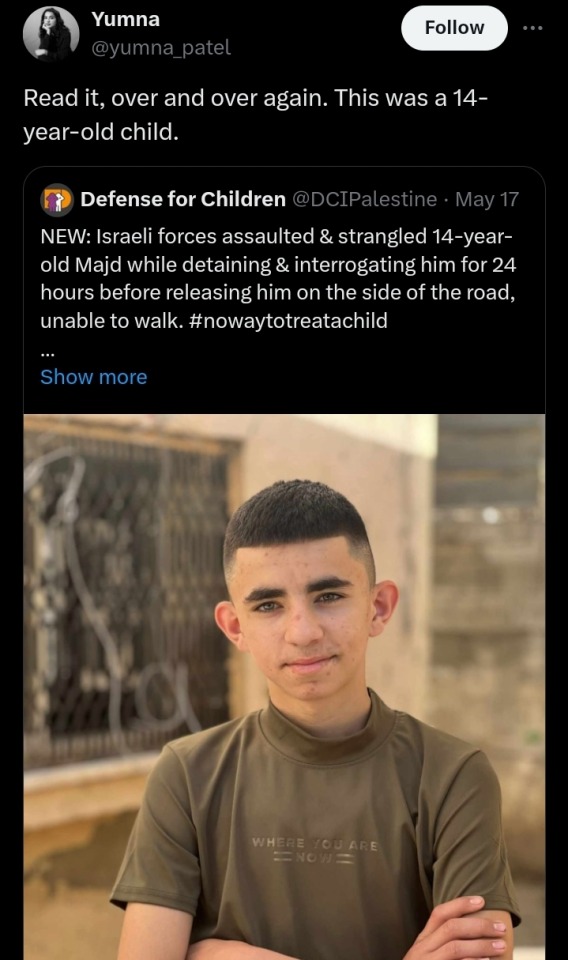
“One of them put his boot on my mouth while stomping on my chest with his other boot,” Majd said.
The military vehicle stopped at an Israeli military checkpoint located at the northern entrance to Azzoun. Majd was taken out of the vehicle, forced to stand still and a soldier repeatedly assaulted him with the stock of his rifle on the chest, head, and waist while directing insults at him.
“I was begging him to stop hitting me but to no avail. He then wrapped his hands around my neck, pressed with all his strength, and said to me in Arabic, ‘I'll kill you by strangulation.’" Majd passed out and regained consciousness around 5 p.m. and found himself in a room, lying on the ground and surrounded by a soldier, a cat, and a military dog. “I felt really scared, mostly because the sounds made by the dog were terrifying. I started screaming out of fear because the cat scratched my face many times,” Majd told DCIP. “The soldier said in Arabic, 'I will let the dog eat you.'
"Israeli forces continued torturing Majd until around 2 a.m, slamming his head against a wall several times, causing him to collapse and ask for water, but his request was rejected and they forced him to remain silent.
Israeli forces transferred him to Emmanuel Police Station for interrogation at 3:30 a.m where his tie and blindfold were removed. The interrogator accused him of throwing stones at Israeli military vehicles and then allegedly subjected the boy to physical violence for two hours, forced him to sign an electronic screen with an electronic pen, and tied his hands and blindfolded again, according to documentation collected by DCIP.
Between January 1, 2016 and December 31, 2023, DCIP documented 838 cases where Palestinian children detained by the Israeli military were systematically tortured, handcuffed, blindfolded, strip searched, and denied access to food and water during the interrogation period.
In nearly all cases documented by DCIP, Israeli authorities interrogated Palestinian child detainees without the presence of a lawyer or family member, and children were overwhelmingly denied a consultation with a lawyer prior to interrogation. Israeli forces use coercive tactics, including the use of informants, resulting in children unintentionally making incriminating statements or even false confessions.
4K notes
·
View notes
Text
coming up with an au were a dead character lives but shaking my head while i do it so everyone watching knows i support the role their death played in the narrative and consider it a legitimate writing choice
21K notes
·
View notes
Text
one of my greatest pet peeves in fiction, and it is truly stupid I know, is that no one seems to understand how genuinely hard it is to kill someone via stabbing. stab wounds have a mortality rate of like 5%. especially abdominal stabbing. tv shows and movies show dudes getting stabbed one time in the lower abdomen with a tiny knife and then they fall over. like what did he die of precisely. that man died of Small Knife
60K notes
·
View notes
Text
AU where sqh is secretly an avid consumer of historical manhwas with allllll the plotting and scheming so when he wrote about the northern court he added in so much lore in the footnotes and forgot about it like the best of us. When he transmigrated in and he started catching wind of vaguely familiar plots he was like oh damn im done for and started plotting too. SQH whos a spymaster now and destroys the lives of those who oppose MBJ over tea (MBJ is shaking hes so down bad)
65 notes
·
View notes
Text
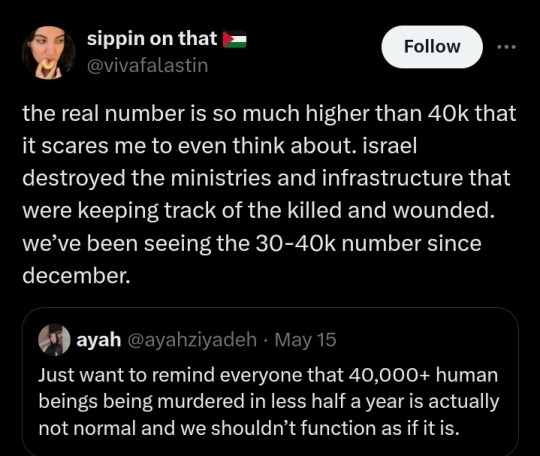
In Yemen the death count stagnated at 15,000 until the war ended and the people were able to count their dead. Today, it's commonly accepted that over 300,000 Yemenis have been killed by war and famine. We will see a similar situation in Gaza after a ceasefire.
20K notes
·
View notes
Text
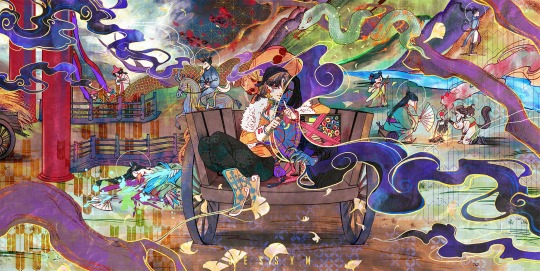
A peculiar bookseller arrives in town, full of stories and mysteries to share.
This time, he tells the tale of a bird who took the place of another, yet seemingly no one could tell the difference…
606 notes
·
View notes
Text

WATCH THIS VIDEO
a very, VERY important post. spread everywhere and screen record the video to your phone. or message me and ill happily send you the video. give to every woman and girl you know.
bc as they both said / demonstrated, its not only super easy to do, but super easy to miss.
92K notes
·
View notes
Text
Update: North Gaza Women's Project!
Mahmoud Abu Salama is doing an amazing thing in North Gaza! He is starting a project to help Deaf Palestinian women use their pastry making skills while also distributing food to families in need. This is helping both the women make a bit of a living and feed the hungry in the North.
By donating, we’re helping Mahmoud hire more women who take pride in helping both themselves and their communities! So please feel free to donate if you have a few dollars to spare, or spread the link if you're unable! Any little bit helps!
HelpGazaChildren Notion Site || #helpgazachildren tag
GoFundMe Link
[Quick ID: Video of Mahmoud Abu Salama speaking to the camera with women sitting on the floor behind him as they put together packages of pastries. We then get a closeup of the women who sign to the camera.]
11K notes
·
View notes
Text
before october 7th this blog was a meme page btw.
7K notes
·
View notes
Text
400 DAYS OF GENOCIDE IN DARFUR AND WAR IN SUDAN AND ELON MUSTY WANTS TO ISOLATE SUDANESE PEOPLE FROM THEIR LIFELINES!!!!



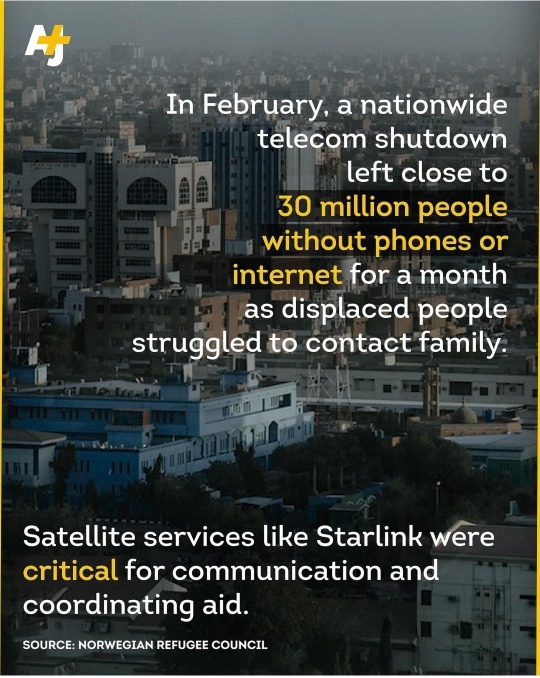

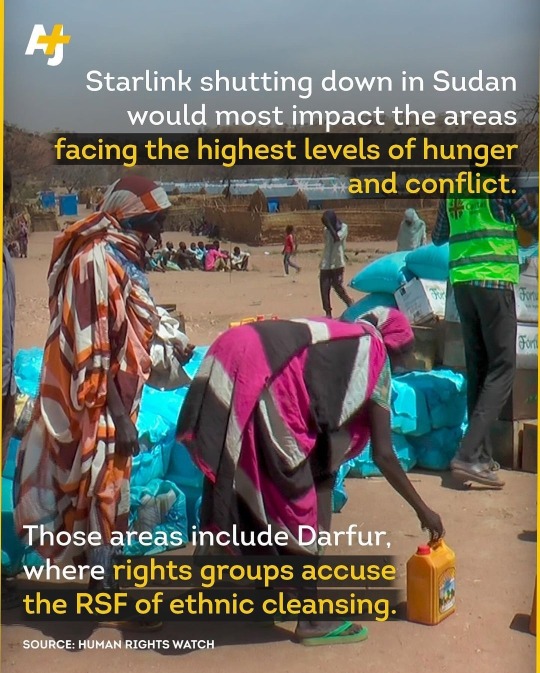
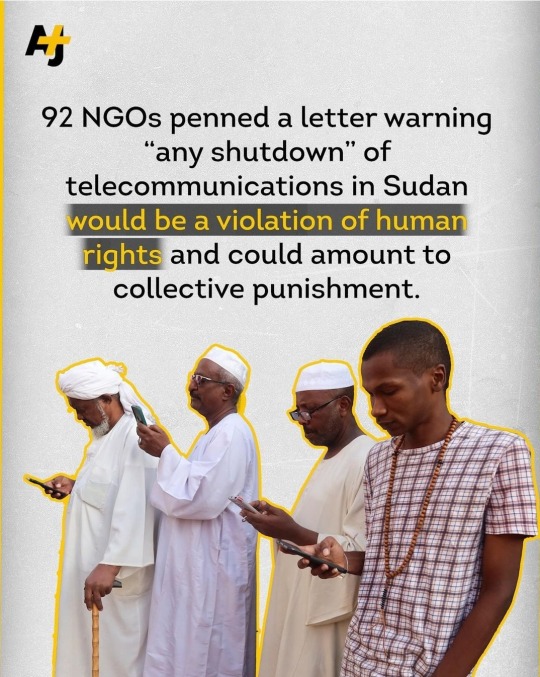
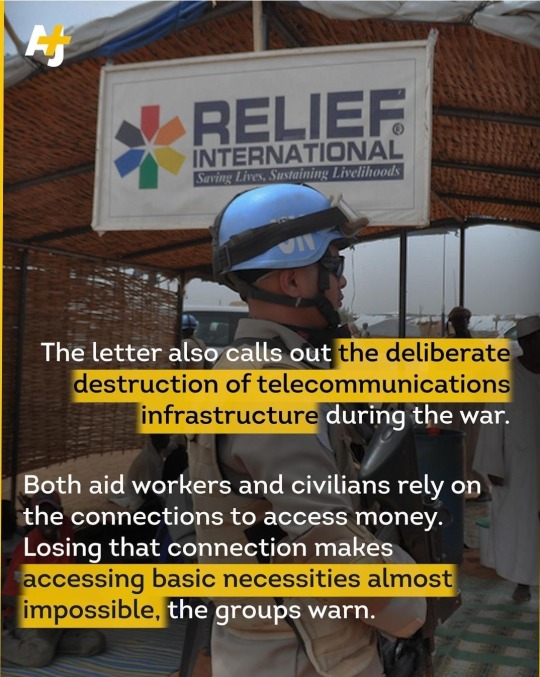
Source; Al Jazeera.
4K notes
·
View notes
